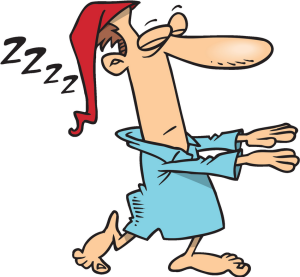“Sleepwalking, formally known as somnambulism, is a behavior disorder that originates during deep sleep and results in walking or performing other complex behaviors while asleep,” (National Sleep Foundation). Roughly 8.4 million adults sleepwalk in the United States according to the May 2015 issue of the journal, Neurology reports CBS News. Many people ask themselves, why do I sleepwalk? Why when I “sleepwalk” do I actually do other things other than walk? How can I prevent it from happening?
To address the first question, being why do people sleepwalk, the most common and simple answer is the fact that people lack sleep. People who are deprived of sleep are much more likely to sleepwalk. There is also the fact that people with a family history of sleepwalking are more probable to sleepwalk. Sleepwalking can be rather dangerous, resulting in potential confusion, some amnesia, and physical damage from running into objects throughout the surrounding areas. Sleepwalking can be rather dangerous and those who do it should take extra precautions in order to prevent themselves from doing it.
A study was done to by researchers at a Université de Montréal teaching hospital in which the test subjects in 25 humans where deprived of sleep for 25 hours and were later compensated in sleep and monitored as they slept. However, they were placed in a bed with five foot containment walls surrounding them. Each subject responded in their own unique way. An individual would firmly grasp the sheets and while others would try to climb the walls. These sleepwalkers, if were to be let go, could of injured themselves by running into surrounding objects. It just so happens that my roommate sleepwalks on nights where he has been lacking a normal nights rest due to studying.  He often wakes up with his shoes placed randomly throughout on the mens restroom floor. My roommate could very easily run into his desk on his way out and hurt himself. The reasoning behind this is often due to fact that certain individuals dream about partaking in certain activities. Or they are thinking about what they may need to in the upcoming future. All are linked to the the brain continuing to work as the body attempts to rest according to multiple news reports.
He often wakes up with his shoes placed randomly throughout on the mens restroom floor. My roommate could very easily run into his desk on his way out and hurt himself. The reasoning behind this is often due to fact that certain individuals dream about partaking in certain activities. Or they are thinking about what they may need to in the upcoming future. All are linked to the the brain continuing to work as the body attempts to rest according to multiple news reports.
A way an individual can ensure they limit their chances of sleep walking is simple, getting more sleep. Sleepwalking, as I stated in a previous paragraph, is often caused to lack of sleep, so the best way to decrease the chances of sleepwalking is going to bed at a reasonable time and making an effort to get at least eight hours of sleep per night.
Sleepwalking is something that can be very dangerous and can be caused by a few reasons. If one comes across a sleepwalker, they are suggested to slowly grab them by the shoulders and guide the individual back to their original resting place.
Works Cited:
https://sleepfoundation.org/sleep-disorders-problems/abnormal-sleep-behaviors/sleepwalking
http://www.cbsnews.com/news/more-than-84-million-americans-sleepwalk-each-year-study-finds/
http://www.livescience.com/32460-why-do-people-sleepwalk.html
http://abcnews.go.com/Health/Wellness/weird-things-happen-sleep/story?id=23606162#3

This post is very interesting! I have always wondered about sleep walking and never fail to forget the great Step Brothers sleepwalking scene, but this scene has always made me wondering if sleepwalking could be so severe. For example, I heard a story of one of my friends where he sleepwalked into his parents room, peed on their floor, and then went back to sleep. This was curious because he had no recollection of the event so he was obviously asleep. It crazy to know that people can be capable of doing so much in their sleep! I have found through WebMD that there is also medication you can take to help with sleepwalking such as ProSom, and I’d be curious to see how this affects ones sleepwalking habit. This was an interesting post on an interesting topic and you have provided me with some great information!